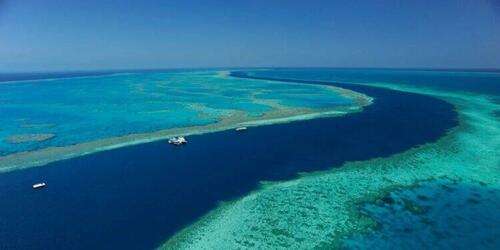
Mainstream Naysayers Gather As Hopes Rise For 4th Year Of Record Coral On The Great Barrier Reef
Authored by Chris Morrison via DailySceptic.org,
In the next few days, the Australian Institute of Marine Science (AIMS) will issue its annual report on the state of the Great Barrier Reef (GBR). For alarmists promoting the Net Zero fantasy the news has been dire over the last three years, with record coral reported across the largest reef in the world.
Such is the obvious despair even daft excuses suggesting it is the wrong type of coral have been heard.
Faced with inconvenient facts, the usual groomed game plan in mainstream media has been to issue dire warnings of possible imminent collapse and then keep schtum when the sensational figures surface.
Recently the BBC gave us its “’underwater bushfire’ cooking Australia’s reefs”. Alas, the Australian Government’s Reef Authority is less cataclysmic in its reporting, noting indications in June this year that there were “no current heat stresses across the Reef”. Between April 14th and May 31st, 342 impact inspections were carried out which found coral bleaching on just three of the 34 reefs surveyed.

We must wait for a fuller picture from the upcoming 2024/25 AIMS survey but available details suggest another healthy year for the GBR. The BBC agitprop reported on dire conditions at the Ningaloo Reef off the Australian north-west coast, but it linked the GBR by noting a “worrying superlative”. Reefs on both sides of the continent have been bleached for what is claimed to be the first time. “It’s like a raging bushfire that has persisted for months now, wreaking harm right across the coast”, said Paul Gamblin, who heads up the Australian Marine Conservation Society. “It’s an absolutely devastating event and people are reeling from it. It is enormous. It’s unprecedented. It’s absolutely not normal”.
Quite how the BBC can witness a current underwater “bush fire” raging across the GBR is not immediately clear. Nor is it clear how the BBC can report first time bleaching across all of Australia’s main reefs when the process is a natural event that has certainly occurred over hundreds of millions of years of coral development. The BBC reports that the “heatwaves” in Australia are all part of something called the “fourth global bleaching event” which “experts say” has swept across large areas of the globe affecting more than 80% of the world’s coral reefs.
Meanwhile, back in the world of observational science, the Reef Authority reports that in June 2025 most of the observed GBR coral bleaching was at low levels of 1–10% and only in the northern region. No bleaching was observed in the central and southern regions. The biggest current threat appears to be the ever-lurking crown-of-thorns starfish, with outbreaks impacting a number of regions. Work continues on culling operations. Drops in ocean temperatures have been reported across the Reef, although they are still said to be above average – an average, of course, based on just a few decades of measurement. Short-term rises in temperature can induce coral bleaching but they appear to quickly recover. Tropical coral grows in waters between 24°C and 32°C, and growth is generally quicker in warmer seas. Short-term natural spikes come and go, leaving a politicised trail of shrieking headlines in their wake.
The AIMS annual survey usually runs up to June so it is of interest to observe what the Reef Authority has been reporting during the year. In February, summer sea temperatures were falling across most of the Reef with impact surveys showing low levels of bleaching across almost the entire area. Back in September 2024, the surveys revealed that most of the 31 individual reefs observed “showed no signs of coral bleaching, with very few cases of minor bleaching reported in each region”. In October, it was noted that temperatures across the marine park were around 0.6°C higher than average but they were “not at levels that typically cause impacts such as coral bleaching”.
The mainstream grooming over coral on the Great Barrier Reef, once a poster event for inducing mass climate psychosis, is plain for all to see. Ahead of 2024’s third record-breaking growth year, a convenient non-story appeared in Nature that claimed “climate change” posed an “existential threat” to the GBR. “The science tells us that the GBR is in danger – and we should be guided by the science”, Professor Helen McGregor from the University of Wollongong told Victoria Gill of BBC News. The existential threat is “now realised” reported the gibbering Guardian. In fact the Nature paper used proxy temperatures and climate models to suggest temperatures around the vast reef area were the highest recorded in 400 years.
Your correspondent might have missed subsequent reports in both the Guardian and BBC about the three record-breaking years of coral growth. I asked Grok for help and the reply came back: “I couldn’t find reports from the Guardian and the BBC specifically stating that the Great Barrier Reef has shown ‘three record-breaking years of growth’.” Grok further noted that there was no coverage of last year’s performance but rather it focused on challenges due to “global heating”. Just four months before last year’s announcement, the Guardian noted that the GBR faced its worst summer on record with widespread bleaching.
Will this be a record fourth year of a news blackout on the amazing resilience of one of the great wonders of the natural world?
Tyler Durden
Thu, 07/31/2025 – 18:25
